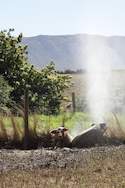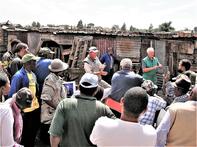
When starting pig farming in South Africa you will need a plan. In fact, everything pig farming enterprise needs a plan, from the thousand-sow unit to the two-pig herd in the backyard of a poor-resource owner wanting to increase his family’s income. Whether it is a large commercial pig farm or a tiny one, the basic planning rules are the same.
The first thing to start with is the desired outcome, the end result. Do you want to breed and sell weaners? Or buy weaners and grow them to slaughter? Or buy and sell pigs as a speculator? Or breeding and raising young pigs up to slaughter-age?
The second thing to consider when starting a pig farm is to estimate the market requirements – how flexible, seasonal and what competition there already is.
Thirdly, consider the restrictions, regulations, health and environmental by-laws, town planning intentions for the town or area you plan to set up your farm?
Then, do a preliminary cost of production. You will need to calculate the basic cost of raw materials, what buildings (such as housing) are required, how much mechanization as well as the number of workers and their skill levels you will require.
If the end-product is perishable (pork meat), determine what is the shelf-life and storage capacity, refrigeration, transport, packaging you will need.
Funding for Pig Farming in South Africa
When planning pig farming you must find funding and/or finance to carry the new business through the period of development. The development phase will include setting up fencing, buildings pens and housing, buying equipment and sorting out labour, power, water supply, rates, insurance, while still paying your household expenses.
Determine how long will it be before there is an income so that the cash flow becomes positive and starts to make up the backlog. A realistic cash-flow estimate is essential, but often the worst part of a business plan. One is trying to predict the cost of production, interest on loans, running expenses, storage and balance these against the returns from sales over a future period of time when values and expenses are variable and unpredictable.
However, if a start-up entrepreneur wants to approach one of the possible sources of funds and be taken seriously, he or she must have gone to the trouble to enlist the help of someone who understands finance and, just as important in this case, pigs. Together, they will be able to develop a business plan that should get them through the first stage of a viable enterprise. There are several organizations who are in a position to help and focus on the support of small-time farmers in particular.
The South African government is the leader in the field and a succession of Ministers of Agriculture are on record as strong supporters of subsistence farmers and farmers in the informal sector. There is a substantial fund made available in the annual budget and with the Provincial Departments of Agriculture, this is allocated and spent through local provincial selection committees which have representation from the appropriate farming specialities.
Other arms of government such as the Department of Rural Development and Land Restitution have a role. However, there is never enough funding to satisfy the applications so other organizations come into the picture, including the Land Bank, provincial aiding funds and municipalities. In general, the beginner or small-herd pork producer should approach the Provincial Department in the first instance and find the section dealing with farm support and development.
Training and Advice for New Pig Farmers

The most prominent and active organisation is the South African Pork Producers Organisation (SAPPO), to which most commercial producers belong. SAPPO is now increasing their membership among the aspirant small-herd section of pig farmers.
SAPPO has access to levy funds contributed by commercial farmers and collected at slaughter on a per-head basis. These funds are, in consultation with government, employed for the promotion of the pork industry and a percentage is directed to developing farmers for activities related to upliftment and training.
These funds, are not cash for funding new businesses or feed costs. The Pig Veterinary Society (PVS) is a group of the South African Veterinary Association which works in close cooperation with SAPPO and commercial producers in organizing training and advisory courses, practical demonstrations and planning sessions. These training sessions focus on biosecurity, welfare, feeding and housing of pigs, disease prevention and management.